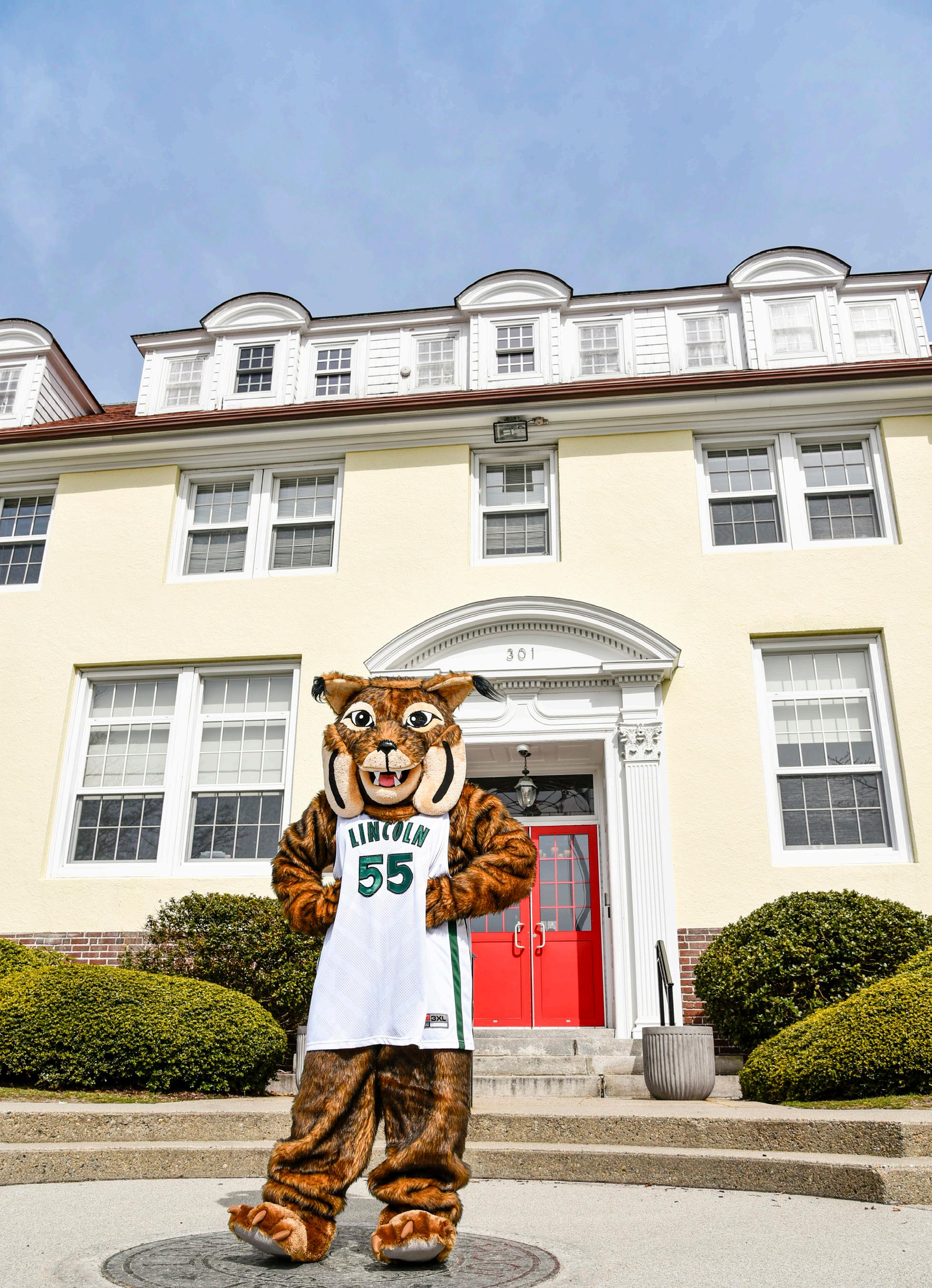
WINTER 2024
MAGAZINE
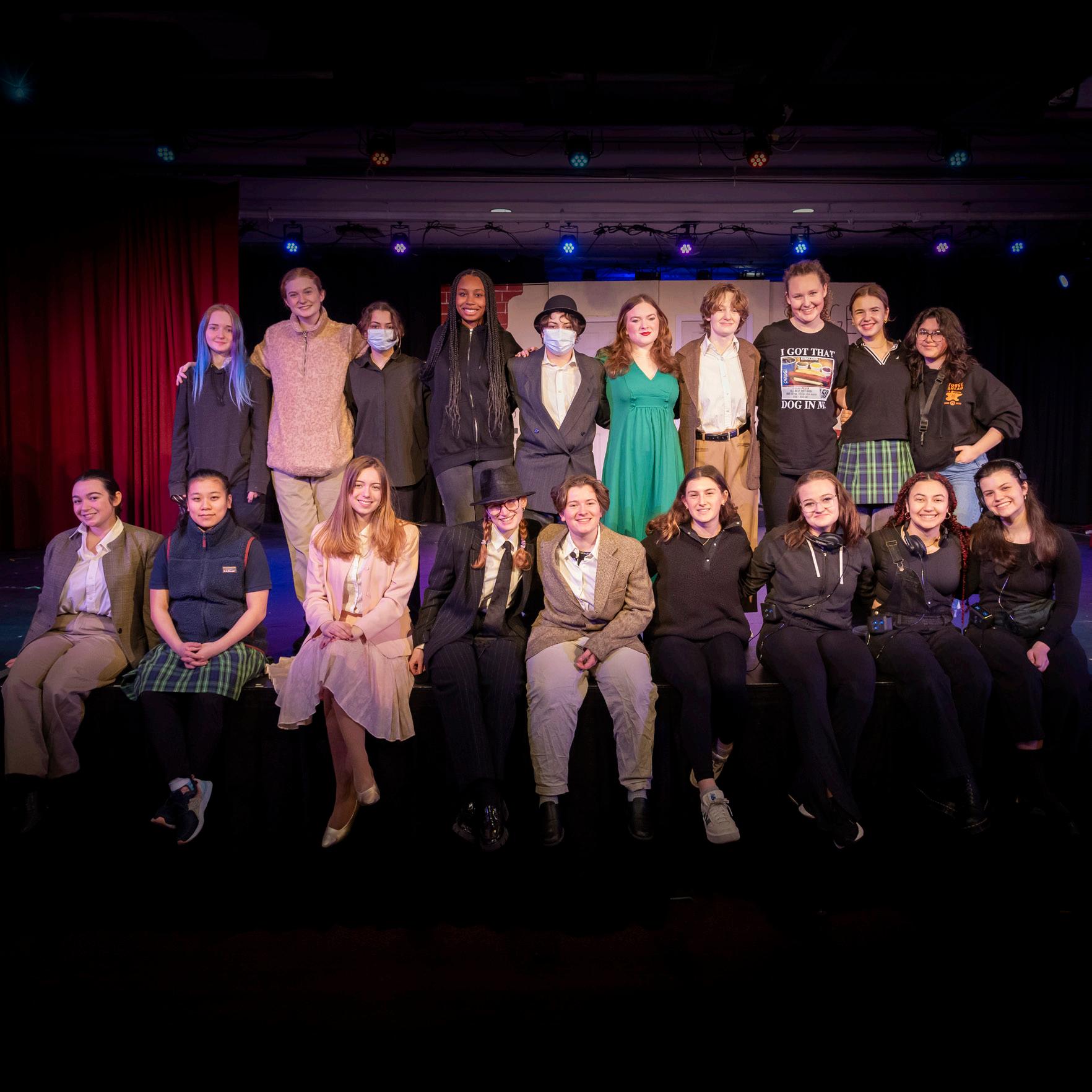
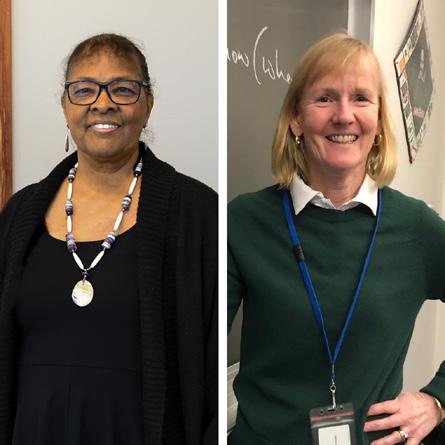
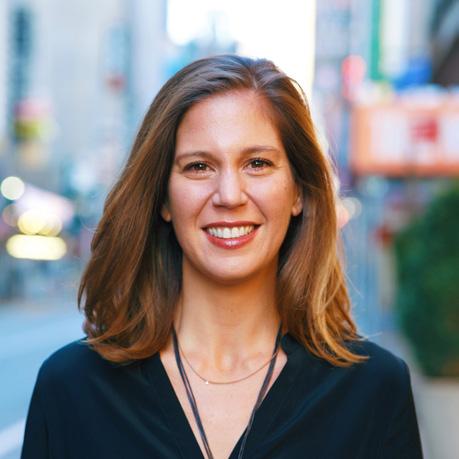
Leading Alana Chloe Esposito ’03
A snapshot of a Lincoln alumna at the top of her game
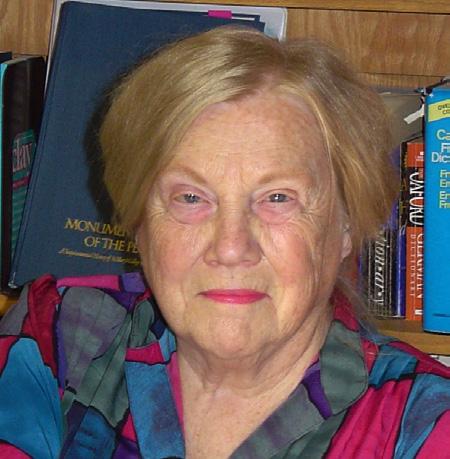
Angel Beth Smith ’78 + Ellen Elcock O’Malley Alumna and former coach reflect on their Lincoln experiences. Page 4 Reflections
Janet Butler Haugaard ’50 Caribbean and Brit lit professor and college editor. Mother and cherished friend. Page 16
LINCOLN WINTER 2024
Creative Team
Lincoln School Team
Erica Busillo Adams, Director of Advancement
Marci Mitchell, Director of Communications
Lydia Mackela, Photographer
Sophia Theriault ’16, Project Manager
Glenn Osmundson P’12, Photographer
blazar design studio, Designer
Baldwin,
1
Page 12 Contents Features In This Issue WINTER 2024
send change of
Sarah C.
Writer ©2024 Lincoln School. All rights reserved. Please
address to advancement@lincolnschool.org Advancing the Joy
2 6 8 10 11 14
the Head
Avenue
On
Sweater
Work Spotlight
Students,
Students
Letter from
Butler
Bulletin Hands
Story of a
Student
For
By
The senior cast, crew, and musicians of “Kiss Me, Kate”.
Letter from the Head
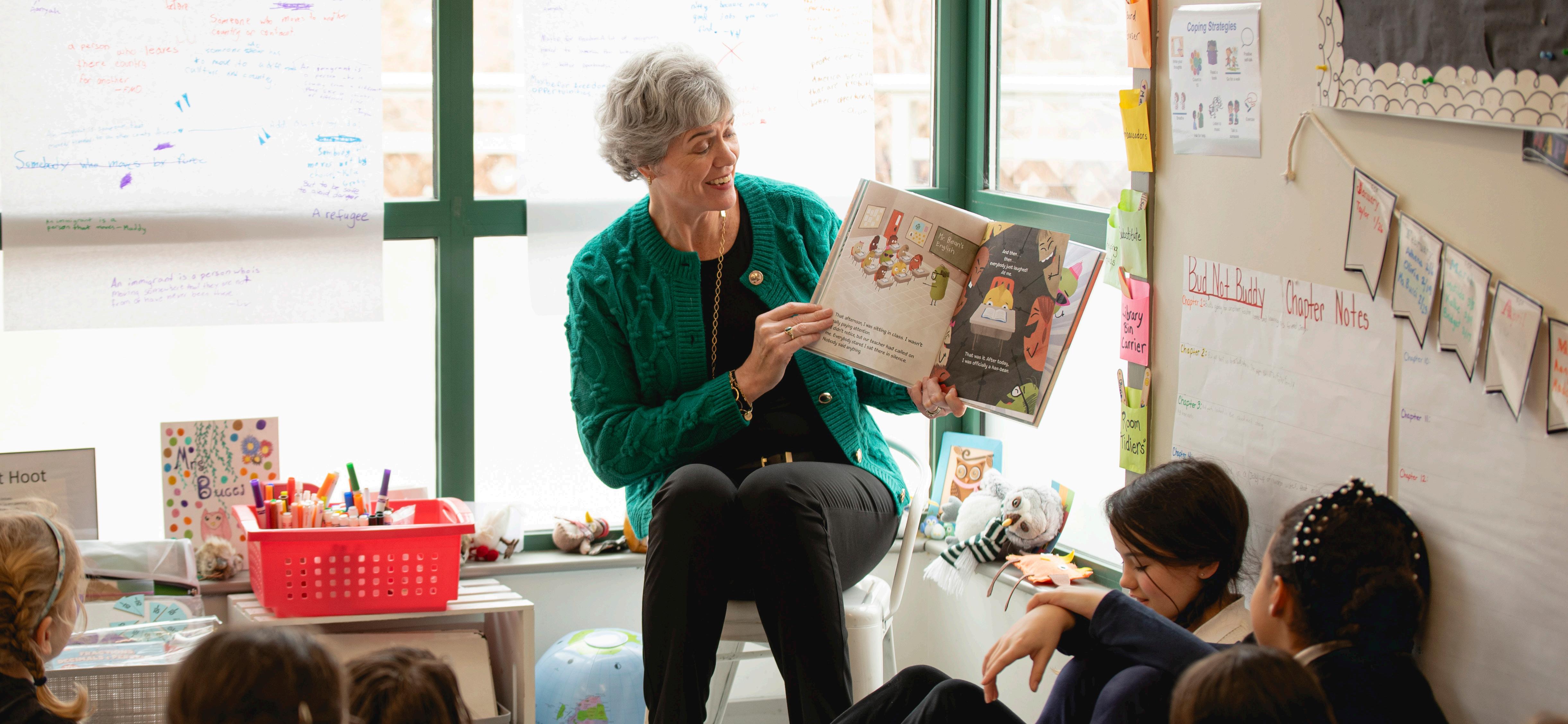
Iam inspired daily by our powerful mission to educate girls to fearlessly embrace the opportunities and responsibilities of citizenship in a complex world. From our very youngest learners in the Little School to our Grade 12 students beginning to think about life beyond Lincoln, we are equipping young people with the skills and competencies they will need to lead lives of meaning and purpose.
Admittedly, it is difficult to know exactly what our “complex world” will look like when our current students are adults. The uncertainty and volatility of our present time can make the future feel uncomfortably unpredictable. In
recent years, I have embraced the concept of “futurist thinking” to help maintain a positive and optimistic approach to the many possibilities that the future holds.
Futurist thinking is not about predicting the future; rather it is about “designing for a preferred future.” It involves looking at signals and trends, and using those to determine what we, as educators, should be paying attention to as we create learning experiences for our students.
In a recent professional development workshop, our faculty and staff engaged in
some futurist thinking exercises, one of which involved imagining the schools of the future. What elements of our current approach to education will endure? What will evolve, in response to changing environmental, economic, and social conditions? How do we prepare ourselves, and our students, to adapt to a rapidly changing world? These can be hopeful and optimistic questions to explore, and I was inspired by the energy and creativity that our faculty and staff brought to the conversation.
Without a doubt, the characteristics and qualities that make a Lincoln education
unique and meaningful will stay constant: our faculty’s deep commitment to student growth, student engagement in real-world problem-solving, and our commitment to fostering curiosity and exploration in pursuit of our best selves.
Onward Together,
Sophie Glenn Lau ’88 Head of School
3 2
Clockwise from top left: Mia Q. ’27, Gabby A. ’27 Cassidy W. ’27, Nina D. ’27
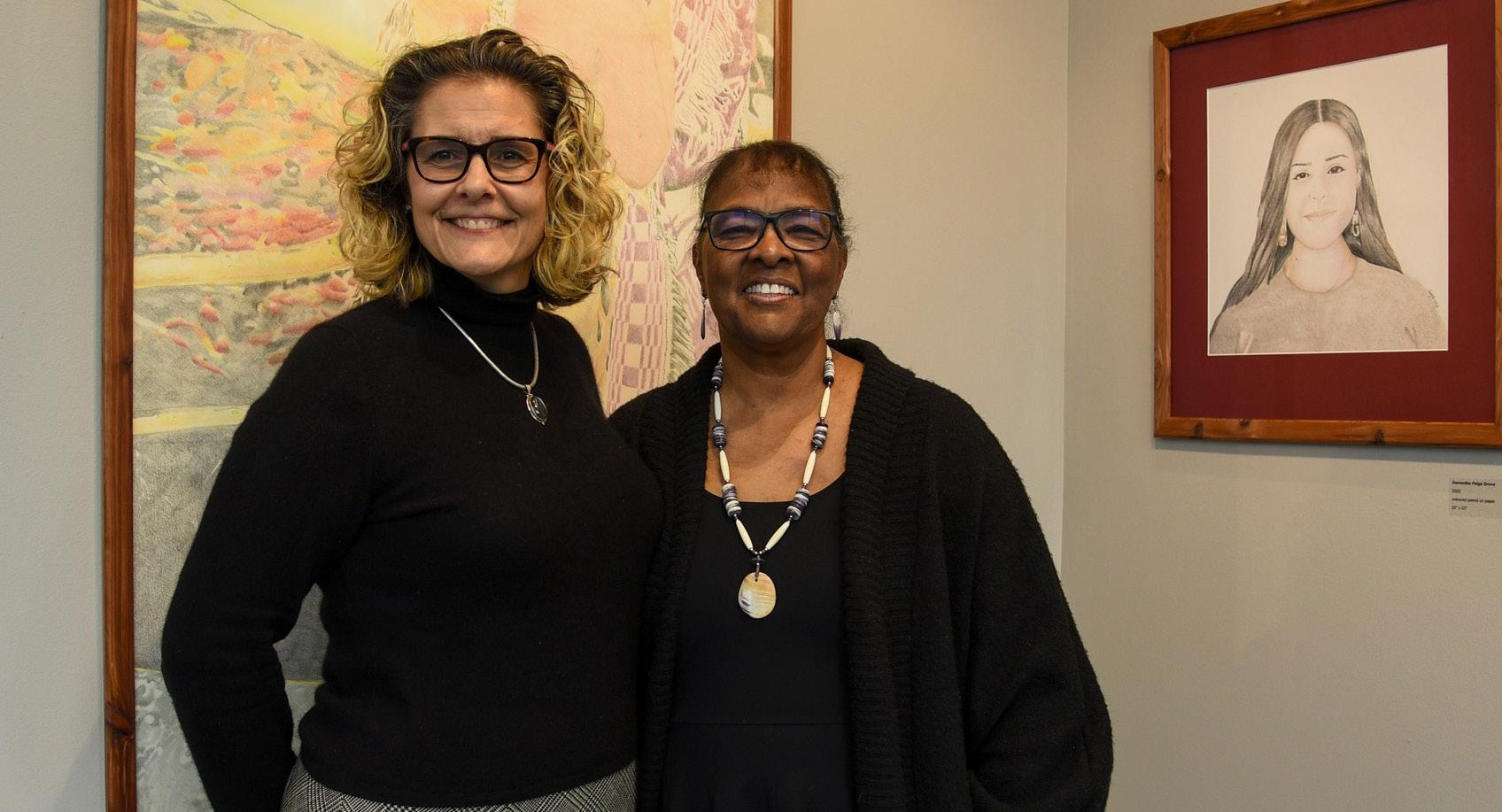
Advancing the Joy
Angel Beth Smith ’78
Living her purpose
Distinguished Narragansett artist and Lincoln alumna Angel Beth Smith ’78 presented her latest art collection, “The Indigenous Peoples Project: The Mashantucket (Western) Pequot Women,” in the Murray Family Gallery at Lincoln School on January 10, 2024. Before the exhibition opening, Angel shared with Middle and Upper School students how Lincoln School (and a few special people) shaped her purpose-filled future.
In the heart of Lincoln School, where dreams are nurtured, Angel Beth Smith ’78 found her purpose amid the simplicity and peace she cherishes. Her journey began at the age of 11, a quiet child labeled an introvert. However, it was at Lincoln that she discovered the transformative power of genuine friendship. Angel’s connection with Emily Leonard ’78 was a turning point, an irreversible act of true kindness that resonates with her to this day, as she was her first true friend. At Lincoln, the environment fostered the idea that every student could become whatever they aspired to be, and
Angel thought her path would lead to music, her passion. Little did she know that her true purpose would unfold through the strokes of art.
Simplicity and silence became Angel’s guiding values. In 2016, during Native American Month, she showcased her work centered around Mashantucket Women. The theme of women, specifically the Mashantucket Pequot women, spoke to her deeply. These women had embraced her, offering support and guidance when she needed it most. To express her gratitude, Angel turned to her newfound purpose —art—specifically drawing these women who had such a lasting impact on her. Using colored pencils, she brought to life the emotions and stories of the Mashantucket Pequot women.
“Value your education here. It will carry you through. Savor your days here,” Angel passionately said, addressing current students. The message echoed the profound gratitude she felt for the school that had provided her with the tools to find and live her purpose. She
also emphasized the importance of looking beyond the drawings themselves. It wasn’t just about the lines on paper; it was about recognizing the kindness reflected in each face. The exhibition stood as a testament to the impact these women had on her life.
Angel credited Lincoln teacher Mrs. Surprenant for guiding her down the artistic path, along with her best friend, Emily, for forever altering the course of her life. In a beautiful tribute, Angel named her daughter after the friend who had shown her the transformative power of kindness.
Living her purpose with simplicity and peace, Angel stands as a testament to the profound impact a nurturing environment, true friendship, and the mentorship of one caring teacher can have on shaping a fulfilling life. Through her art, she not only expresses gratitude but also encourages others to find their purpose in unexpected places.
Ellen Elcock O’Malley
Veteran teacher and coach reflects on Lincoln School’s impact on her career as an educator.
By any measure, joining the faculty of New York City’s esteemed Trinity School — where Ellen Elcock O’Malley has taught history for more than 20 years and serves as fifth grade dean — is a notable achievement. But, she said, “I don’t think Trinity would have hired me without my Lincoln School experience.”
That career began in spring 1986, when Athletics Director Julie Greene ’54 hired her to coach the JV lacrosse team. At the time, O’Malley was a sophomore at Providence College, where she had been recruited to play Division I field hockey and lacrosse. In fall 1989, when Robin Kirkwood Auld, Lincoln’s former PE faculty and coach
began a one-year sabbatical, she became a fulltime PE teacher and coach. “I jumped in for that year,” O’Malley said, “and one year turned into 14.”
During those years, O’Malley taught sixth grade geography and history and coached varsity basketball, field hockey, and lacrosse to divisional and state championships titles. She chaperoned ski trips and accompanied the field hockey team to Scotland. After 11 years as the athletics director, Julie Greene ’54 retired and O’Malley took the helm.
“Ms. Elcock was game-savvy, calmly commanded respect, and wasn’t afraid to share a giggle or incorporate input from her players,” recalled Lindsay Bowen Coe ’96. “It was fun and rewarding to play on her teams.”
O’Malley valued Lincoln’s traditions and community spirit and found her students “smart, funny, and motivated.” But she credits her role models — including Greene, former Head of School Joan Countryman, former Middle School Director Kathleen Capo, and former History Department Head Ruth Marris-Macaulay P’99 with constituting the foundation of her career.
“I was surrounded by intelligent, articulate women who always put the needs of their students first,” she said. “They were formative, profound influences.”

5 4
Angel Beth Smith ‘78 (right) with Anita Richard Thompson ‘89 (left) at the exhibition opening.
Butler Avenue Bulletin

IMMERSION
In early February, students in grades 7, 9, and 11 had an amazing opportunity to step into the shoes of U.S. senators for a day as a part of a field trip to the UMass Boston Edward M. Kennedy Institute. The students entered an exact replica of the U.S. Senate floor and participated in a Senate simulation on election reform. Talk about hands-on experience! Each student was assigned a random state and political party and learned how senators go through the legislative process, make decisions, and ultimately vote on a bill.
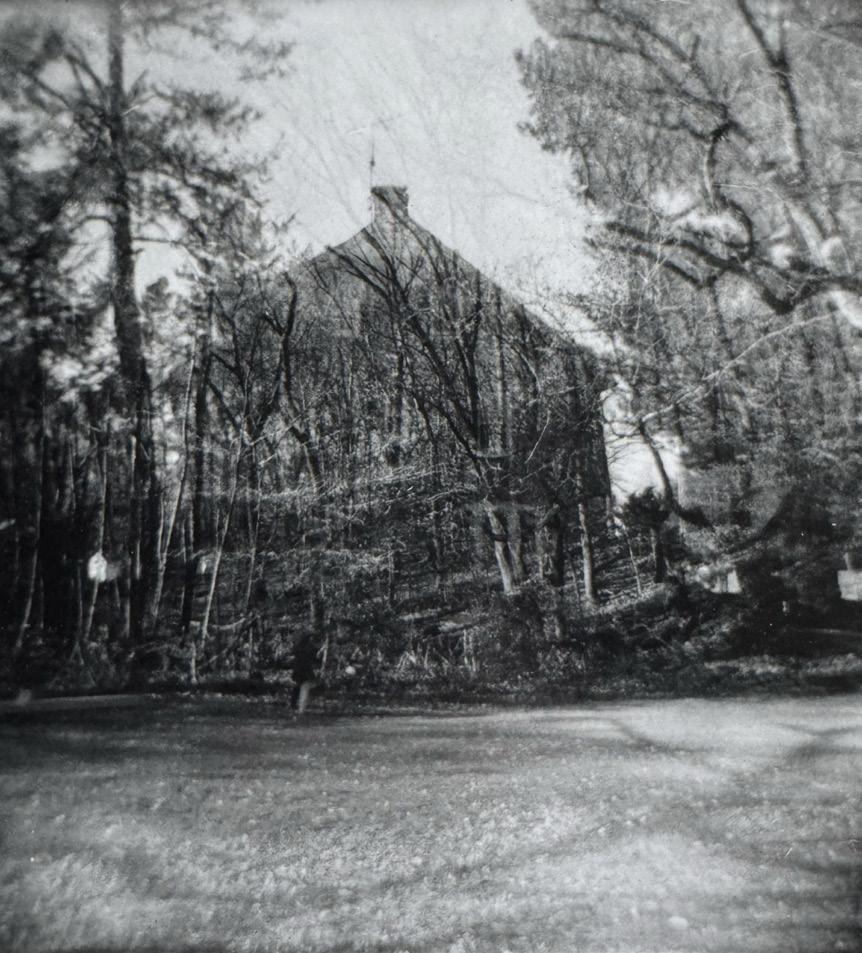
TALENT
More congratulations are in order for Lincoln winners at the 2024 RIAEA Anchor Awards: Chloe B. ’24 (Photography – pictured above), Evalyn C. ’29 (Printmaking), Elle F. ’25 (Sculpture), Bianca M-L ’25 (Mixed Media), and Charlotte M. ’24 (Painting). This juried art show showcases the talent of students in Grades 6-12 from around the state. An extra shout out to Chloe B. ’24 whose work has been selected from the Anchor Award Exhibit to travel to the NAEA Conference Student Exhibition.
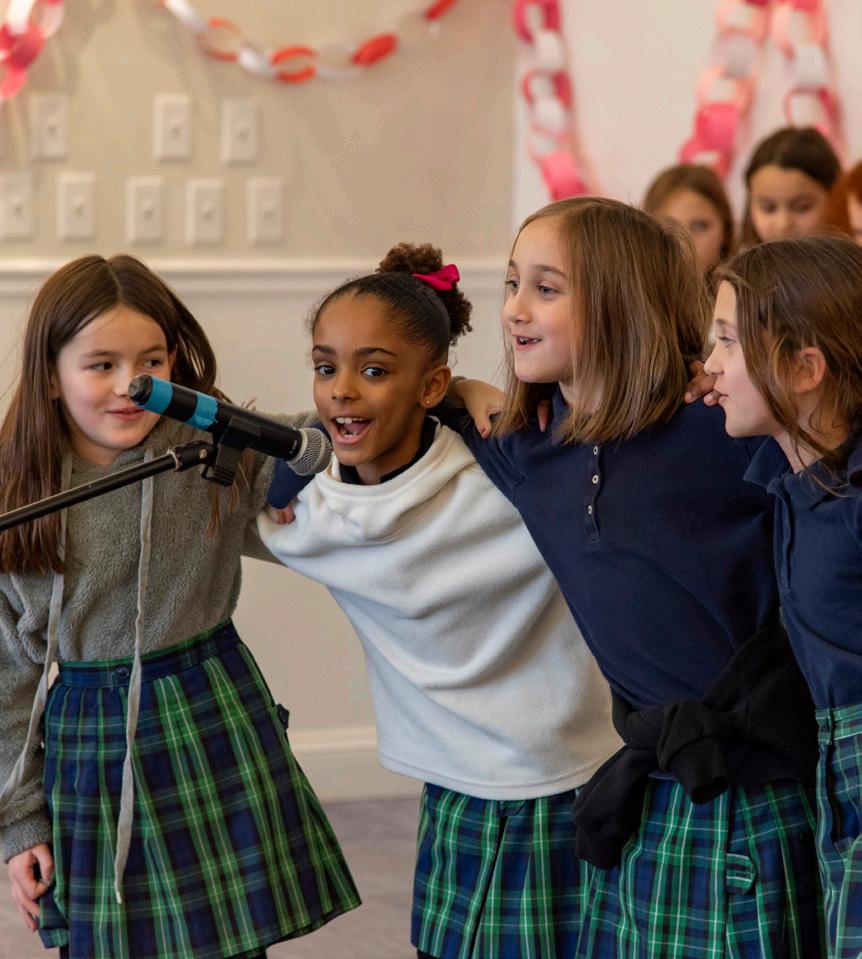
TRADITION
Every year in celebration of Valentine’s Day, Lower School students put on a Valentine’s Sing for their families and the Lincoln community. You can always count on the performance melting your heart as your feet tap along to the beloved songs. “Love is something, if you give it away you end up having more.” There wasn’t one moment when the room wasn’t filled with cheers and smiles!

SOCIAL JUSTICE
In January, Lincoln held Morgan Stone Week, an annual commemoration of Morgan Stone ’00, a founding member of 2B1. Morgan sadly passed away a few months into her freshmen year of college due to an illness. Since then, we have celebrated her spirit and dedication to issues of diversity and equity.
2B1 is a club focused on combating racial injustice and chose The Depths of Identity as this year’s theme. From understanding how identity is expressed through art to recognizing how so many of our identity points intersect with others’, 2B1 felt that empowering our individual stories and uniqueness was an essential practice this year.
7 6
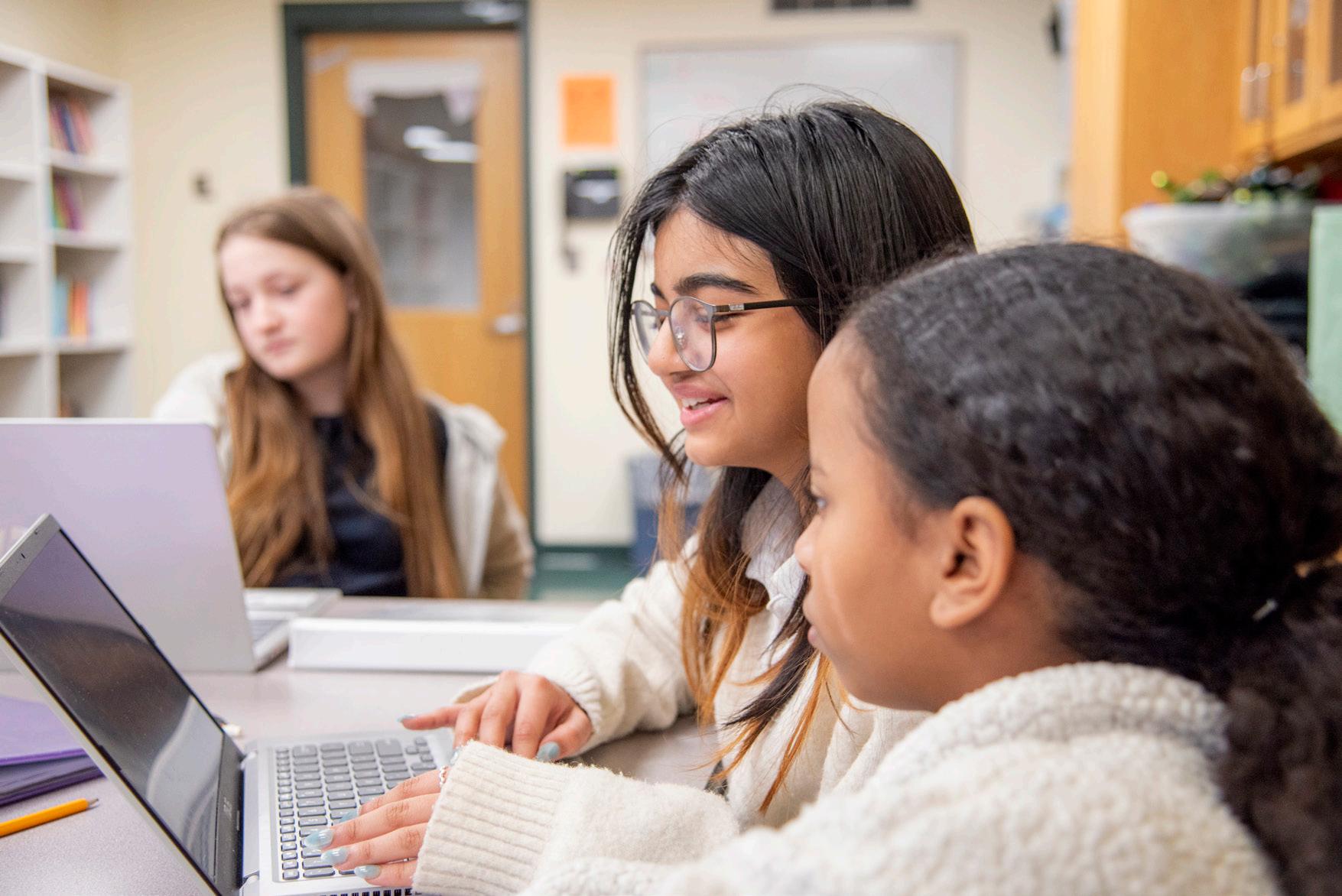
HANDS On
With rebecca Sullivan
A look at Lincoln’s signature approach to active learning
The podcast opens with a few bars of a snare drum, bass, and keyboard groove worthy of a ’70s detective show. Seconds later, the host’s voice lays out her thesis: contemporary TV shows and movies, such as the Avengers franchise, misrepresent ancient myths and gods — and she intends to set the record straight.
No, this is not an episode of This American Life, and the voice does not belong to Ira Glass. It belongs to eighth grader Elizabeth P. ’28, a member of Rebecca Maizel Sullivan’s Middle School podcast elective. Her podcast is titled “The Gods Behind the Golden Curtain.”
“I wish someone would write Loki as someone who does foolish things but owns up to his mistakes,” Elizabeth concludes, confidently adding, “because that’s who I think he is.”
The new elective is an outgrowth of the success of Sullivan’s seventh grade English class. Two years ago, she was seeking something that could replace the literary magazine, which had lost momentum during the Covid pandemic. How about podcasts? she wondered.
podcasting affect their executive functioning skills? Will it give them agency and choice?’”
That summer, she dove into the how-tos of the popular medium, and by fall had added podcasting to the regular curricular line-up of traditional poetry, spoken word, and theater.
Now in its second year, the podcast section remains popular among seventh graders. They choose a topic of their choice, research it, request and perform interviews, then write and record a script.
“Students have to come up with a central idea and develop evidence to support it,” Sullivan said. “It’s essentially an essay, but I’m hiding it in something much more fun.”
After adding royalty-free music and carefully editing, students submit their final products, all under 8 minutes long, to the annual student contest held by the New York Times and to NPR’s Student Podcast Challenge.
Last year, then-seventh grader Ava V. ’28 won an honorable mention from NPR for “Dress Codes,” in which she explored the pros and cons of school uniforms — specifically, the Lincoln kilt. In addition to her own opinion, she gathered a variety of viewpoints by interviewing fellow students as well as Upper and Middle School Dean of Students Kara Newman-Gilligan.
“How about podcasts?”
grader Maddie B. ’28 , who took the elective last semester.
Her latest podcast, titled “Book Worms and Brains,” kicks off authoritatively: “Before we get into today’s episode, we need to define two important terms.” Maddie proceeds to explain the difference between a ban and censorship.
Other topics this year include investigations into a Rhode Island vampire and the possible haunting of the Providence Athenaeum by Edgar Allen Poe.
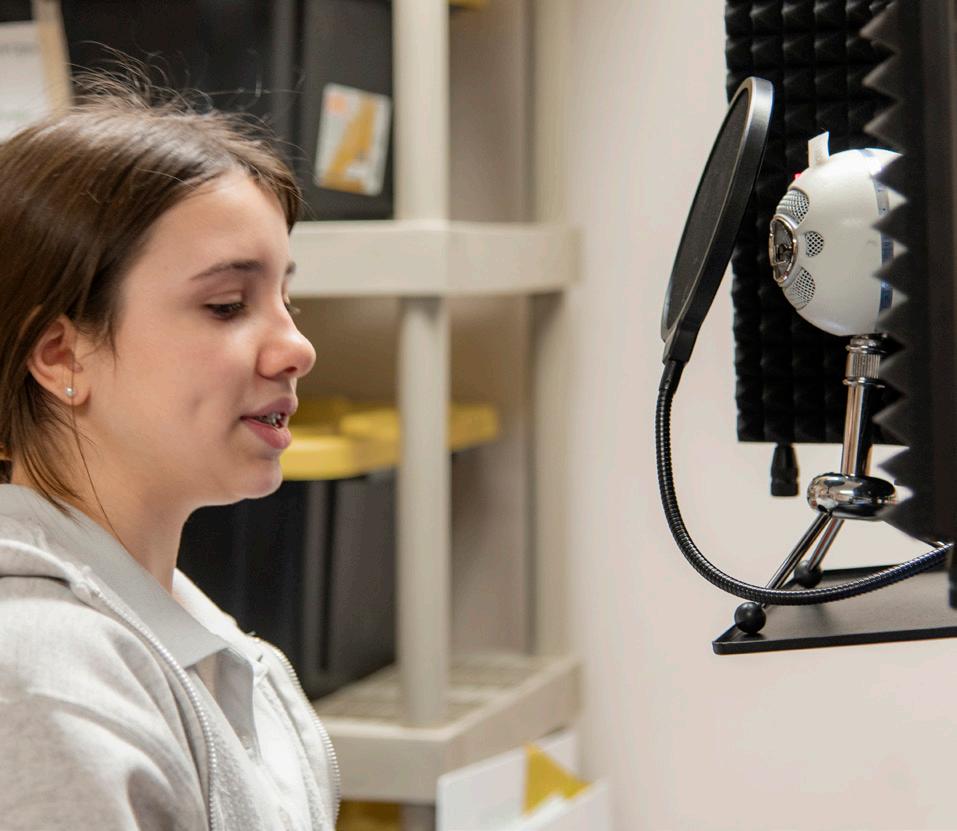
“One of the core questions of our year is, How do we use our voice?” said Sullivan. “Middle schoolers really want to feel like they’re being taken seriously. They want to feel like their voice is heard.”
“I thought, ‘Where are the kids socially, emotionally?’” Sullivan said. “ ‘How will
Ava admits the process was no walk in the park. “You write the script the way you want it, but there’s always something that isn’t clicking, and you have to go back again and again.”
“I definitely learned how to organize my information — what’s going to sound best and catch the listener’s attention,” said eighth
Indeed, in her podcast decrying the bad rap sharks get in the media, Safia N. ’28 declares, “I personally love sharks, and think you should too.” And Maddie ends her banned-books episode with a challenge: “I am ready to stand up for what I believe in. Are you?”
Rebecca Maizel received a Summer Curriculum Grant funded by the Hibbitt Rockwell gift to work on podcasts.
9 8
Story of a Sweater
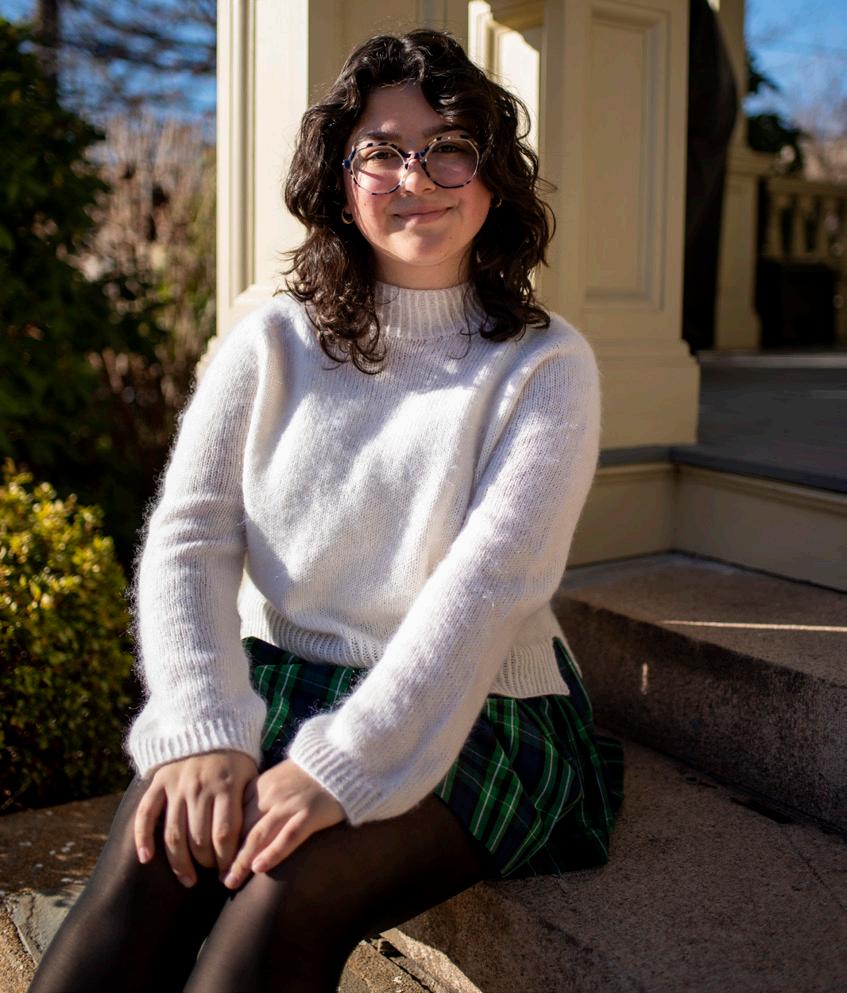
From the moment Jessica B. ’24 , a member of the Class of 2024, stepped into Lincoln School as a freshman, she was enamored by the idea of crafting her own sweater for Lumina, a cherished annual event at the school. Lumina represents a rite of passage for Lincoln seniors, and Jessica, with a passion for the arts that she has cultivated since childhood, embarked on a journey to create the perfect white sweater. (It is a Lumina tradition that all seniors wear white turtlenecks with their uniform, while all other guests wear dark-colored clothing.) Her connection to knitting began at the age of 5, as her grandmother patiently taught her to knit, sew, crochet, and cross-stitch.
Determined to make her mark on the tradition, Jessica dedicated herself to knitting a sweater that would be a testament to her love and commitment to the school. The process, spanning a month, was a labor of passion and creativity. Every stitch was carefully chosen, and every thread woven with energy and commitment. As Jessica poured her heart into the creation, the sweater became more than just a garment – it became a tangible representation of her Lincoln journey.
Keep your light shining bright. Like a torch of hope held high.
Let it glow, let it show. Keep the flame of love alive.
—From Lumina song “One Little Candle”
On the day of Lumina, as Jessica proudly donned her handcrafted sweater, she felt a deep sense of accomplishment and connection to the school’s rich history. The sweater not only kept her warm, but also stood as a testament to the enduring power of tradition, and the lifelong bonds formed at Lincoln School.
Student Work Spotlight
Vika D. ’28 was awarded a Notable Mention in the Write Rhode Island Short Story Competition for her story, The Reefs. She was honored at an award ceremony at the Newport Art Museum. Here is an excerpt.
The muggy air trapped Eabha like a hopeless swimmer in rough ocean waters. Now that Eabha was old enough to work she spent every day of summer digging away in her neighbor’s garden feeling jealous of the flowers she tended whose only worry was getting enough sun.
She wiped her face with her glove. Whether she dried it of tears or sweat she wasn’t sure. The heat made Eabha’s body weak and her thoughts fuzzy. She had not been to school in a while and one day bled into the next without an end in sight. But she was not alone in her labor. Her friend, Saoirse, was by her side, relaxing on a lawn chair, dozing, waking to read the local newspaper aloud for her friend, pausing to sip on iced lemonade.
Saoirse knew that Eabha wasn’t paying attention but she read anyway. She had nothing better to do. Her parents were always busy and she had no siblings, no duties, and no flower beds to tend to. “Did you hear that the Bells are being torn down?” she asked Eabha.
“No. What bells?” Eabha replied, then picked up a shovel and began digging shallow pits to place clusters of flowers in.
Saoirse sighed, “not actual bells. THE Bells. It’s a name. It’s what they call the old horse stables at Brenton Point.”
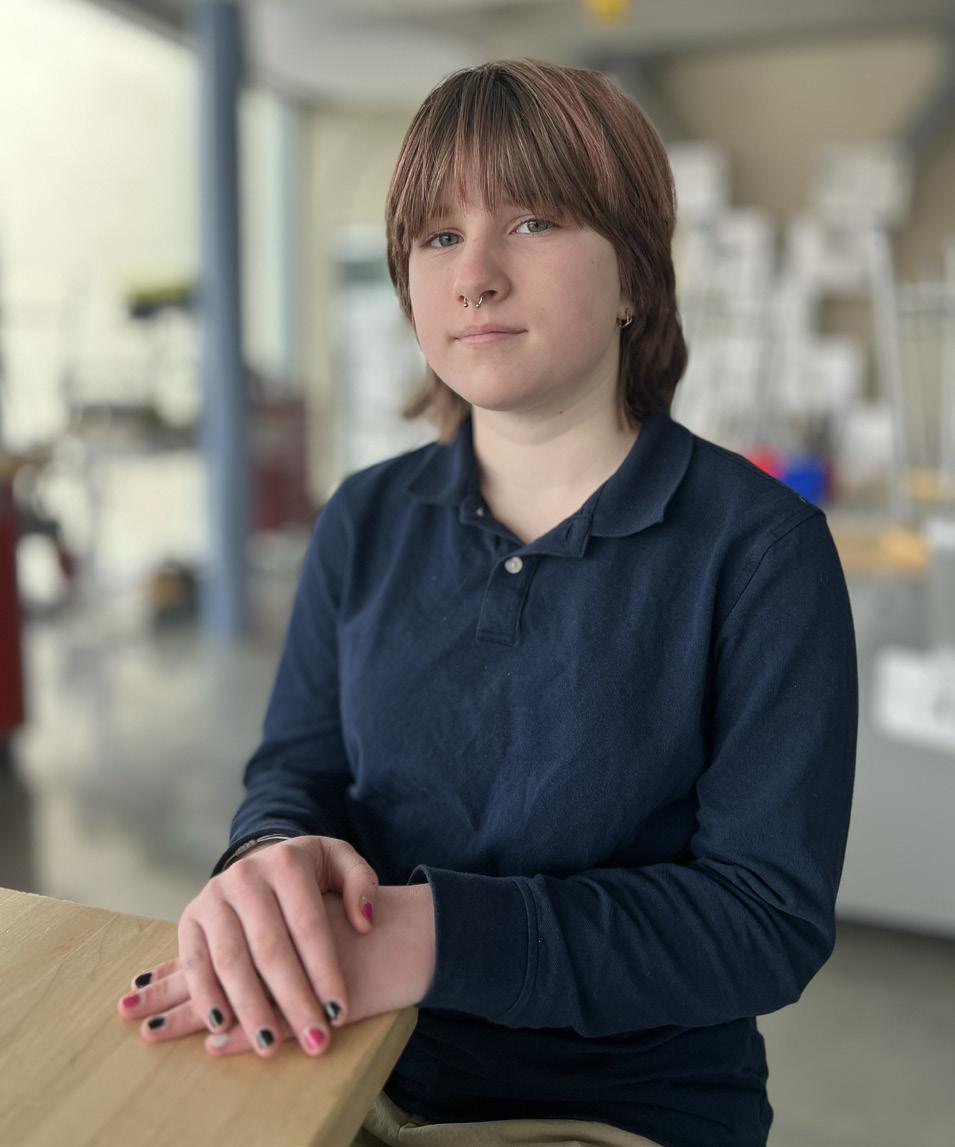
Eabha threw the shovel down again and walked off to search the shed. She heard Saoirse talking as she stumbled and stepped over shovels, rakes, and items older than she stored in the wooden shed since time immemorial. She nearly avoided a nail poking out of the floorboards and felt her stomach twist at the thought of what could have been.
To read her entire piece, scan the QR code below.

11
10
Leading Alana Chloe Esposito ’03
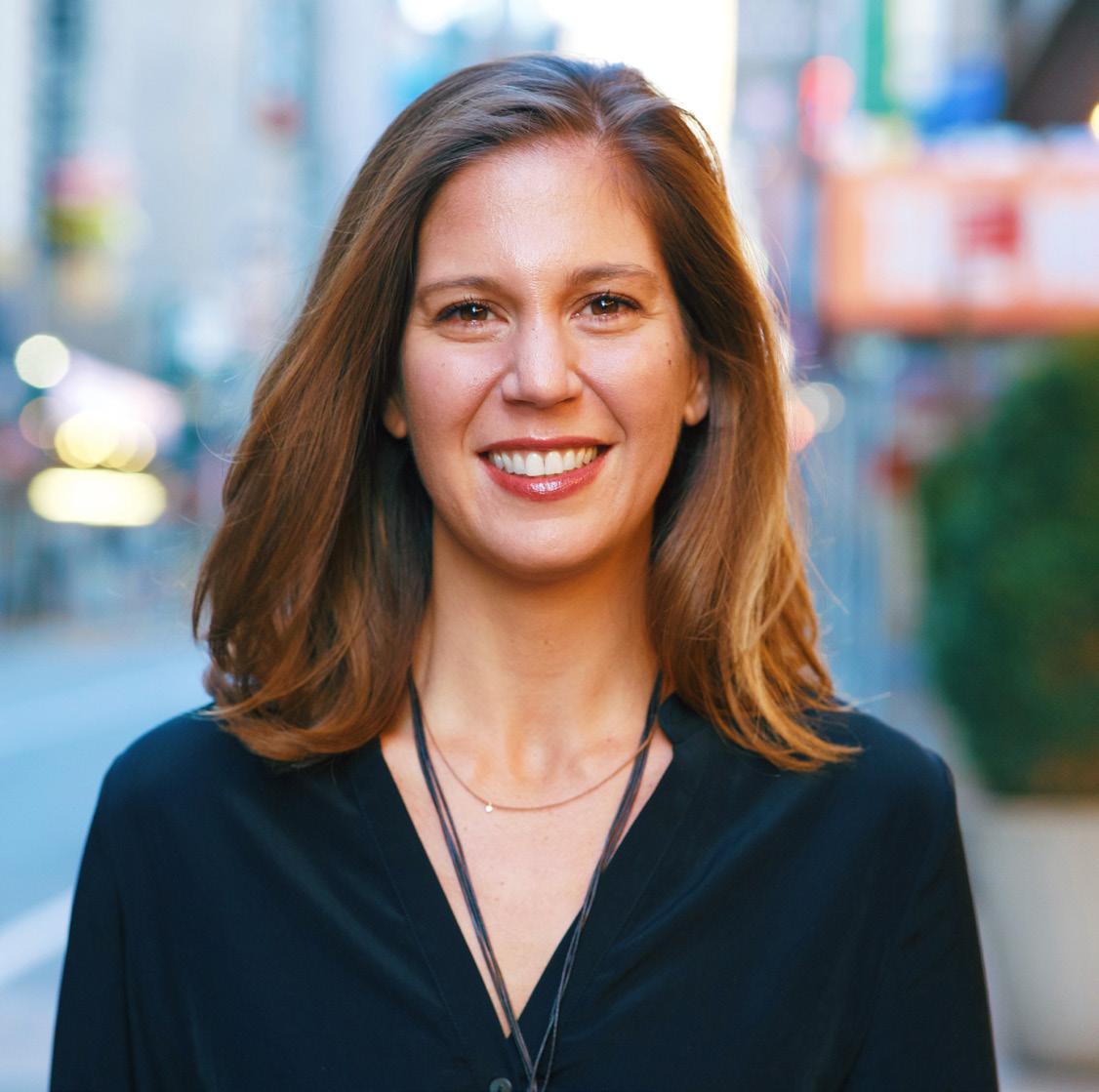
t was winter in Athens, Greece, and the woman and her months-old son, asylum seekers from sub-Saharan Africa, had been spending their nights outside. When they came into the community center, the infant was coughing; the mother was distraught. Alana Esposito ’03, co-director of the humanitarian organization Lighthouse Relief, which shares the center with partner NGOs, connected mother and son with members of her organization’s Protection Program team. After securing two nights of emergency housing for the pair, the team went on to find them a longer-term solution.
“Seeing the relief in her eyes when she was told,
‘Yes, we can help you’ — it’s something you don’t forget,” Esposito recalled.
Lighthouse Relief was founded entirely by volunteers in 2015-16, when half a million people seeking asylum in Europe (most of them from Syria) began arriving on the shores of the small Greek island of Lesbos. At the time, helpers provided dry clothes, hot food, and first aid.
“At first, Greece was a transitory stop,” Esposito explained. After Lighthouse Relief had met their immediate needs, refugees “would go to the United Nations camps, register their asylum claims, and quickly move on to other parts of Europe.”
That changed in March 2016, however, when European countries, overwhelmed by the sheer numbers of migrants, began shutting their borders. For the thousands stranded in Greece, temporary shelter turned into tent camps, and weeks stretched into years.
That’s when Lighthouse Relief added psychosocial support for children living in camps, providing trauma-informed care and helping them build resilience and develop coping mechanisms through sports, creative workshops, language classes, and more.
Lighthouse Relief and its partners at the community center now provide walk-in access to social services, legal assistance, medical and mental health care, housing, food support, a café, and more to the 300 or so daily visitors.
Esposito said that while regional conflicts and natural disasters have increased the flow of people driven from their homes, Greece’s financial crisis and high unemployment have boosted anti-immigrant sentiment and diminished the once-generous assistance it provided.
Esposito, whose mother was Greek, had been working as a journalist writing about the refugee situation on Turkey’s border with Syria in 2015-16. “I wanted to do something that had a more immediate impact,” she said, hoping to apply her skills in Greece. Lighthouse Relief gave her the opportunity.
As co-director, Esposito manages day-today operations, provides strategic planning, fundraises, works with board members, inducts volunteers, and more. She graciously hosted a visit by the Lincoln students who traveled to Greece during spring break to work with NGOs addressing the refugee crisis there as part of the Global Experiences program.
Esposito still feels strongly connected to Lincoln. She received the Distinguished Service Award in 2019, and last December visited campus and gave a talk about her work. She remains close with former French teacher Thierry Gustave and former English and history teacher Bill Meyer (who serves on the advisory board of her organization), and considers former Middle School principal Kathy Capo a mentor.
Since then, the organization has had to adapt to the changing profile and needs of refugees — and to the shrinking assistance from the Greek government.
Greece has also placed more restrictions on NGOs, Esposito added, reducing their presence in the camps and effectively criminalizing solidarity: charges against 16 humanitarian workers of espionage and working for a criminal organization were only recently dropped, for example. Lighthouse Relief, which now has a staff of 12, relies on increasingly precarious funding streams, mostly grants and private donations. “People don’t think there’s still a crisis here,” Esposito said.
But to this graduate of Georgetown University’s School of Foreign Service and of France’s Sciences Po, it’s Lincoln’s communitarian spirit that stands out. When her mother fell ill during her junior year, Esposito recalled, families left food on the doorstep of her home; teachers drove her to the hospital and even offered to accompany her to the funeral in Greece.
It’s this sense of solidarity that Esposito wishes more people had. “People seem to consider refugees as different from themselves,” she said. “But they want the same things for themselves and their kids that any of us want, which is to wake up and not feel unsafe, to be self-sufficient, and to be part of a society.”
13 12 I
A snapshot of a Lincoln alumna at the top of her game
BY STUDENTS, FOR STUDENTS

August S. ’24 loves the humanities and languages, especially English and Latin.
Lucy L. ’24 is a whiz at math and science. Their academic strengths might differ, but they share a passion for their subjects, for helping others, and for creating community.
That triple passion has found its expression in Lincoln Peer Tutors, the student-run volunteer group they formed in the fall of 2022. Since then, they have been ensuring that Lincoln students can access personalized, peer-topeer academic support in a range of subjects.
Here’s how it works. Upper School students who wish to volunteer sign up, listing the subjects they excel in and the times they’re free to tutor. Middle and Upper School students in need of extra support sign up, too. Lucy, director of scheduling, then matches strengths with needs and availability. Students can even request small-group tutoring, which is common among Middle Schoolers, who
might feel a bit daunted. Recognizing that tutoring requires mutual trust and respect, the ultimate hope is that everyone feels comfortable both joining and using the club.
According to the group’s blog, Lincoln Peer Tutors is about more than improving grades. It aims to “build connection and confidence” and “help each other succeed.”
“We are lucky to have a lot of people who are invested in building connections and being able to help other people,” August said. “Lincoln’s teachers want students to be involved in their own learning, to be able to ask questions and advocate for themselves. That is something to emulate.”
“We made it very clear that you don’t have to tutor in everything,” Lucy added. “And there aren’t many students at Lincoln who don’t have a passion for a subject.” Which might explain why this year the group has about 45 tutors; to date, more than 80 students have benefited from its services.
Lincoln Peer
Tutors
is about more than improving grades. It aims to “build connection and confidence” and “help each other succeed.”
This spring, the co-founders will begin to recruit their successors — students who will bring the same spirit of inclusivity, collaboration, and support that has animated the group from the start.
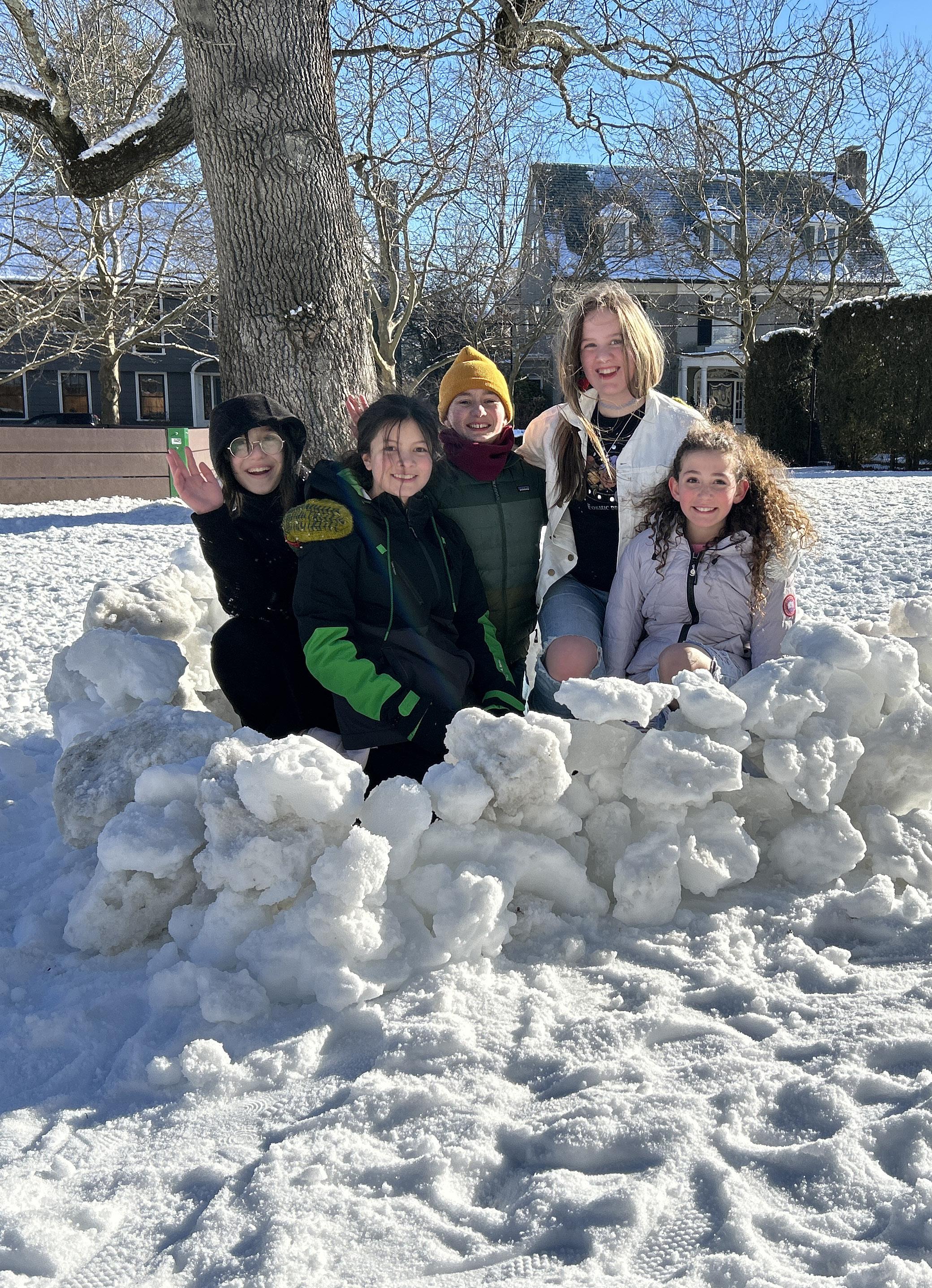
14
Students enjoying the first snow of the year.
Reflections
Janet Butler Haugaard ’50
Caribbean and Brit lit professor and college editor. Mother and cherished friend.
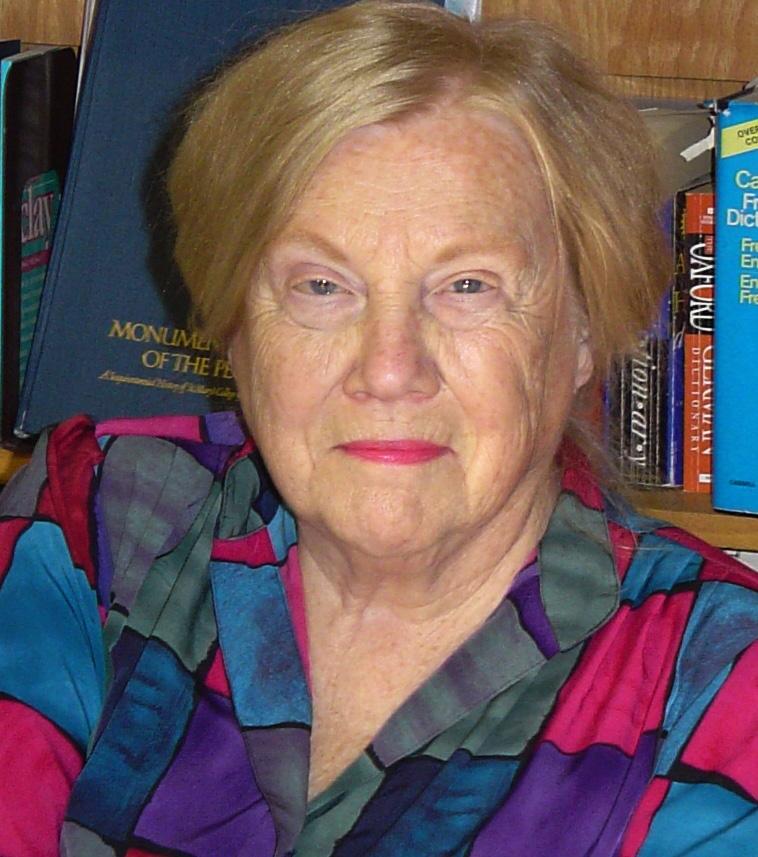
Margarita Haugaard, a California-based attorney and Haugaard’s daughter, was interviewed about her mother’s life and most recent accomplishment, Historical Tapestry: Adele France and John LaFarge in Southern Maryland, published in fall 2023.
After teaching Caribbean and British literature at the University of Puerto Rico for about 25 years, in 1987 my mother became editor and assistant to the president at St. Mary’s College of Maryland, a public honors college near Chesapeake Bay.
Established by the state legislature in 1840 to promote religious tolerance, the school initially taught only “girls.”
In 2009, just after she retired, my mother resumed working on a history of Adele
France, an advocate for women’s rights who was elected “principal” of St. Mary’s Female Seminary in 1923. Under her leadership, the school soon became a junior college, the first in Maryland and among the first in the country. Later it evolved into a liberal arts college.
My mother originally intended to write a slim volume on France, but soon realized she needed to provide historical context — religion, the institution of slavery, and so on. In doing so, she chanced upon a Jesuit priest, John LaFarge, who fought for Blacks’ rights to education and founded schools for Black students in southern Maryland. Since he and France knew each other and were both advocates for human rights, my mother included him in the book.
In 2021, when my mother’s Alzheimer’s disease meant she could no longer work on the manuscript, I began helping. I’m credited as “editor, contributor, and map designer,” but she had essentially written the book.
When I was in high school, my mother told me, “Life is like a tapestry. You see a thread, it disappears, and then it reappears much later.” She also believed that history widens our perspective and enlightens our intellect. That’s why I chose the title Historical Tapestry
My mother is a giving, caring person. Growing up, she was a wonderful guide; now we are friends.
Winter Athletics Round-up
Basketball
Our 2023-24 varsity basketball team moved up to Division III this season and finished with a 13-9 overall record with an overall state ranking of 13. Sarah B. ’26 and Reign W. ’27, two of the best players in Rhode Island, led our team in minutes played and were our leaders in all statistical categories.
Our team made it all the way to the semifinal game against Exeter-West Greenwich, which resulted in a 58-41 loss to close out a tremendous season. We bade farewell to our two senior captains, Holiday H. ’24 and Hevin S. ’24, and will miss the leadership they contributed to our team over the past 4 years.
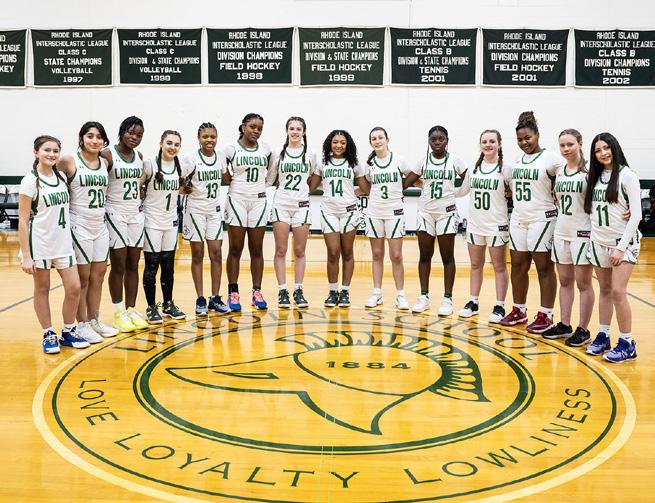

Squash
The squash team’s goal is to introduce as many new students to the game as possible. The team had 15 players, many of them beginners, from a range of class years. They played competitive matches with Portsmouth Abbey’s junior varsity team. Shoutout to our senior captains, Ella B. ’24, Gigi F. ’24, Olive E. ’24, and Olivia V. ’24 for guiding our team during this winter season.
Swim
Lincoln swimmers gave it everything they had at the Girls State Swimming Championships on Saturday, March 2. They dug deep and swam fast! Lincoln came in eighth out of 25 teams. There were significant individual and team accomplishments: Savannah L. ‘24 took first place in the 200-yard freestyle and the 500yard freestyle, Tatum L. ‘27 took fourth place in the 200-yard IM and sixth place in the 100-yard backstroke.
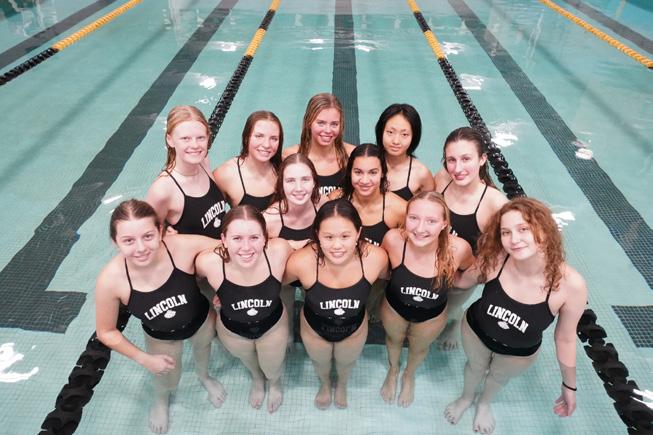
Izzy C. ‘24, Savannah L. ‘24, Téa B. ‘26, and Tatum L. ‘27 took seventh place in the 200-yard medley relay. Izzy C. ‘24, Savannah L. ‘24, Assana W. ‘24, and Tatum L. ‘27 took sixth place in the 400-yard freestyle relay.
5th grade graduation (top) and 8th grade graduation (bottom)
16
17
are incredibly proud of ALL of our student athletes! GO LYNX!
We


A recent query from our Quaker silent meeting:
What is something you can do better with a team?
Butler Ave. Providence, RI
301
02906


























